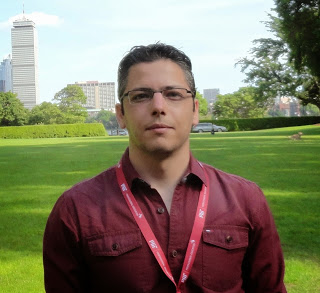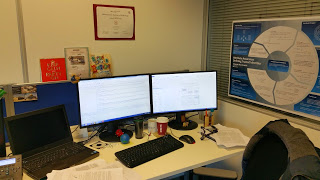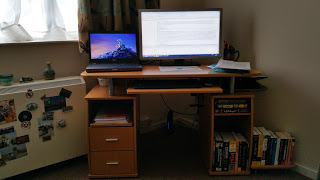I am Salameh Abu Rmeileh and This is How I Work
 Today I am inviting Salameh Abu Rmeileh in the “This is How I Work” series. Salameh is originally from Jerusalem. His first degree is a BSc in Computer Science for WIT in Jerusalem. He came to the UK to do a MSc in Computer Science which he completed with distinction, at Birmingham City University, and then has offered to do a PhD in Information Security at the same university. Currently he is in the second year of his PhD. Also, he works as a graduate teaching assistant for his school and teaches security systems theory module.
Today I am inviting Salameh Abu Rmeileh in the “This is How I Work” series. Salameh is originally from Jerusalem. His first degree is a BSc in Computer Science for WIT in Jerusalem. He came to the UK to do a MSc in Computer Science which he completed with distinction, at Birmingham City University, and then has offered to do a PhD in Information Security at the same university. Currently he is in the second year of his PhD. Also, he works as a graduate teaching assistant for his school and teaches security systems theory module.
Current Job: PhD Researcher & Graduate Teaching Assistant
Current Location: Faculty of Computing, Engineering, and Built Environment (C.E.B.E), Birmingham City University, Birmingham, UK
Current mobile device: Samsung Note 4
Current computer: Dell Precision M4800 Workstation Laptop (Intel Core i7-4900MQ @ 2.8GHz, 16.0GB RAM)
Can you briefly explain your current situation and research to us?
Currently I am in my second year as a PhD student in which I am working on required experiments and the same time teaching security systems theory module. My research is in information security in general and attribute assurance in digital identities in particular. The main focus of my research is to improve the quality and trustworthiness of users’ digital attributes (such as name, address, passport number, etc.) while enhancing the users’ privacy. The motivation for my research is that a significant amount of our daily activities have been replaced by their digital counterparts (online services) such as banking, social networking, and shopping, to name a few. As their real life former selves, online service providers must be able to identify and authenticate their consumers in order to make informed access control decisions. Also, users are often required to memorise multiple passwords for accessing different services, which is cumbersome. Providing an efficient and applicable attribute assurance framework will help service providers to make better decisions, and users to maintain their privacy.
What tools, apps and software are essential to your workflow?
I use a variety of tools to manage my research and daily workflow:
Mendeley for managing my literature
DropBox and GoogleDrive for backup and syncing.
Outlook for emails and calendars.
Evernote for note taking and daily journal writing.
Latex for typing papers and chapters for my research.
Visio for drawing figures and diagrams.
TrueCrypt for encrypting my confidential files.
PowerPoint for creating presentations.
Visual Studio for implementation.
Vmware Workstation for virtual machines and simulations.
Skype for keeping in touch with my supervisors while they’re away, which they always are.
MS Project for project management
What does your workspace setup look like?
I alternate between home office and university office and my lab usually is a virtual machine on my laptop.
This is my desk in our research lab at uni.
And this is my cozy workspace at my place.
What is your best advice for productive academic work?
I don’t think there is one best advice for productive academic work. It depends solely on the personality and circumstances of the individual. But if I have to give one, it will be motivation. As long as the researcher is motivated he/she will definitely productive. The moment we lose motivation our productivity will start falling down even if we are using the best productivity techniques and tools. I’ve seen colleagues of mine who are masters in productivity spent weeks doing nothing because they lost motivation and didn’t feel like it, well, same with me. Keep checking your motivation and try to keep it up to a certain level. When you feel it’s starting to drop think of a way to raise it up again, either by doing something you like or going for a vacation, productivity will come automatically as it’s a symptom of motivation.
How do you keep an overview of projects and tasks?
I use to-do lists and calendars for urgent and immediate tasks and Microsoft Project for long term goals. Also, I use meetings with my supervisors and paper deadlines as checkpoints of my progress.
Besides phone and computer, do you use other technological tools in work and daily life?
Yes. I use routers for experiments and testing, and I use Network Attached Storage (NAS) for daily backups at home.
Which skill makes you stand out as an academic?
The ability to explain complex concepts, theories and maths in a simple yet interesting way.
What do you listen to when you work?
While working I mostly listen to Yanni and some Bollywood songs, although I’m not Indian. However, I find the Hindi music soothing and the fact that I don’t understand the lyrics helps me stay focused and not get distracted.
What are you currently reading?
Currently, I am reading Lethal Code by Thomas Waite. I usually read in bed before going to sleep.
Are you more of an introvert or extrovert? How does this influence your working habits?
I like to think of myself as a little bit of an extrovert. Being social and proactive has its pros and cons. As much as I enjoy socializing with my colleagues either talking about research or general stuff, sometimes it influences my work negatively as I have take work home with me to finish it and in some cases lose momentum. However, a balanced socializing and networking helps me share my ideas, get reviews, learn something new and most importantly keep my sanity. It took me a year to learn how to balance my socializing and focus on my research.
What’s your sleep routine like?
My sleep routine is usually fluctuating depending on how much work I have and if I have approaching deadlines. However, I try my best to have at least 7 hours of sleep each night.
What’s your work routine like?
My work routine varies depending on the week day. I start a usual day with writing, usually till noon, then I take care of management and academic responsibilities, have my lunch, catch up with a colleague, attend a seminar, or having a meeting with my supervisors. Reaching the end of the day I prepare for the upcoming lectures I have to deliver and spend sometime reflecting on my research. I do my research related reading when I reach at my place in the evening while I am having my dinner.
What’s the best advice you ever received?
The best advice I have received was in a time management seminar by one of our professors and it is “Learn how to say No!”. I consider it as the best advice because at the time I wanted to say yes to everyone because I felt so honored that people had reached out, but it really started to impact my work. However, It needs to be said in a polite and professional manner.


